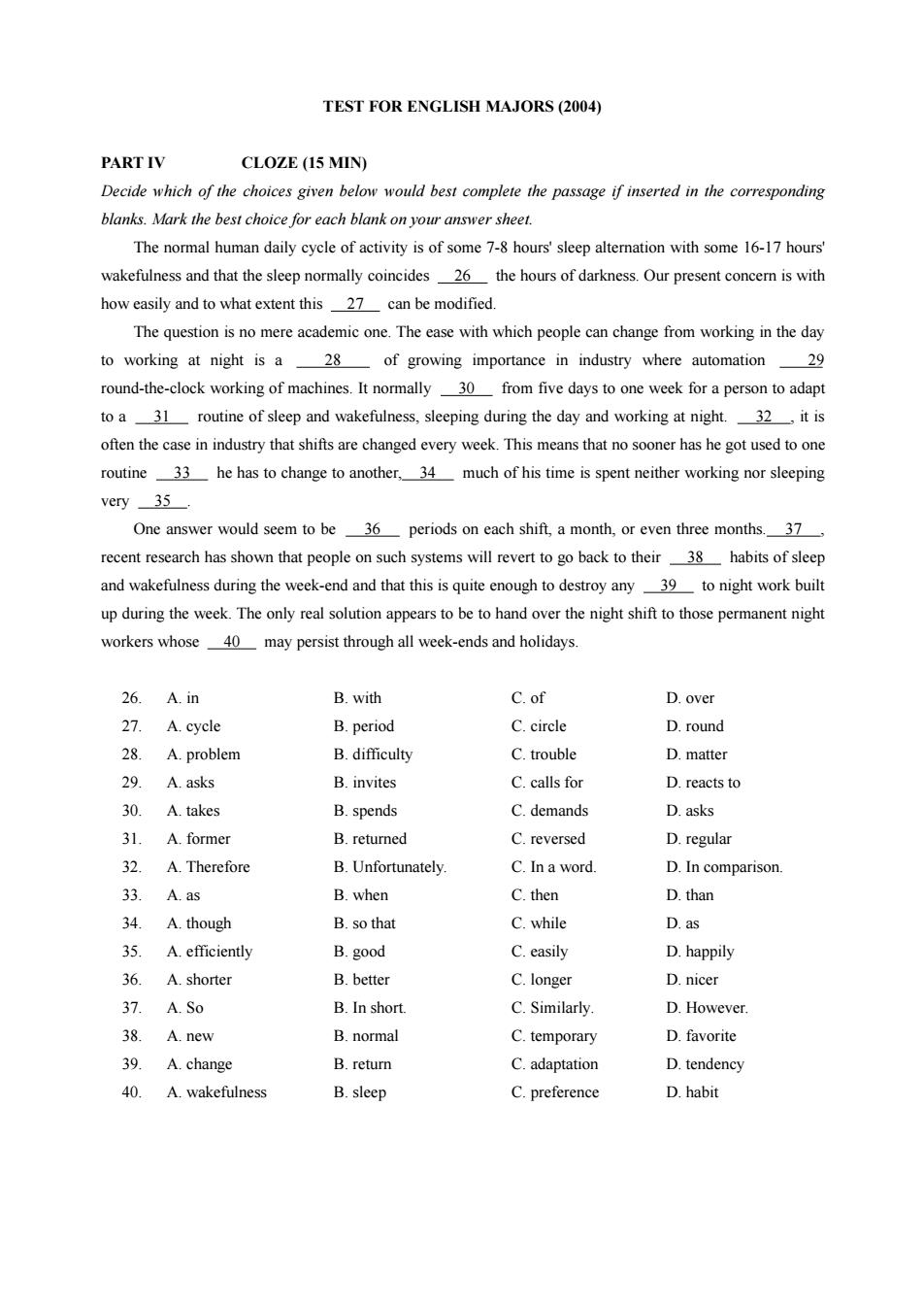正在加载图片...

TEST FOR ENGLISH MAJORS(2004) PART IV CLOZE (15 MIN) Decide which of the choices given below would best complete the passage if inserted in the corresponding blanks.Mark the best choice for each blank on your answer sheet. The normal human daily cycle of activity is of some 7-8 hours'sleep alternation with some 16-17 hours' wakefulness and that the sleep normally coincides 26 the hours of darkness.Our present concern is with how easily and to what extent this 27 can be modified. The question is no mere academic one.The ease with which people can change from working in the day to working at night is a28of growing importance in industry where automation 29 round-the-clock working of machines.It normally 30 from five days to one week for a person to adapt to a 31 routine of sleep and wakefulness,sleeping during the day and working at night.32,it is often the case in industry that shifts are changed every week.This means that no sooner has he got used to one routine 33 he has to change to another,34 much of his time is spent neither working nor sleeping very 35 One answer would seem to be36 periods on each shift,a month,or even three months.37, recent research has shown that people on such systems will revert to go back to their38 habits of sleep and wakefulness during the week-end and that this is quite enough to destroy any 39 to night work built up during the week.The only real solution appears to be to hand over the night shift to those permanent night workers whose 40 may persist through all week-ends and holidays. 26. A.in B.with C.of D.over 27. A.cycle B.period C.circle D.round 28. A.problem B.difficulty C.trouble D.matter 29. A.asks B.invites C.calls for D.reacts to 30. A.takes B.spends C.demands D.asks 31 A.former B.returned C.reversed D.regular 32. A.Therefore B.Unfortunately. C.In a word. D.In comparison. 33. A.as B.when C.then D.than 34. A.though B.so that C.while D.as 35. A.efficiently B.good C.easily D.happily 36. A.shorter B.better C.longer D.nicer 37. A.So B.In short. C.Similarly. D.However. 38 A.new B.normal C.temporary D.favorite 39 A.change B.return C.adaptation D.tendency 40. A.wakefulness B.sleep C.preference D.habitTEST FOR ENGLISH MAJORS (2004) PART IV CLOZE (15 MIN) Decide which of the choices given below would best complete the passage if inserted in the corresponding blanks. Mark the best choice for each blank on your answer sheet. The normal human daily cycle of activity is of some 7-8 hours' sleep alternation with some 16-17 hours' wakefulness and that the sleep normally coincides 26 the hours of darkness. Our present concern is with how easily and to what extent this 27 can be modified. The question is no mere academic one. The ease with which people can change from working in the day to working at night is a 28 of growing importance in industry where automation 29 round-the-clock working of machines. It normally 30 from five days to one week for a person to adapt to a 31 routine of sleep and wakefulness, sleeping during the day and working at night. 32 , it is often the case in industry that shifts are changed every week. This means that no sooner has he got used to one routine 33 he has to change to another, 34 much of his time is spent neither working nor sleeping very 35 . One answer would seem to be 36 periods on each shift, a month, or even three months. 37 , recent research has shown that people on such systems will revert to go back to their 38 habits of sleep and wakefulness during the week-end and that this is quite enough to destroy any 39 to night work built up during the week. The only real solution appears to be to hand over the night shift to those permanent night workers whose 40 may persist through all week-ends and holidays. 26. A. in B. with C. of D. over 27. A. cycle B. period C. circle D. round 28. A. problem B. difficulty C. trouble D. matter 29. A. asks B. invites C. calls for D. reacts to 30. A. takes B. spends C. demands D. asks 31. A. former B. returned C. reversed D. regular 32. A. Therefore B. Unfortunately. C. In a word. D. In comparison. 33. A. as B. when C. then D. than 34. A. though B. so that C. while D. as 35. A. efficiently B. good C. easily D. happily 36. A. shorter B. better C. longer D. nicer 37. A. So B. In short. C. Similarly. D. However. 38. A. new B. normal C. temporary D. favorite 39. A. change B. return C. adaptation D. tendency 40. A. wakefulness B. sleep C. preference D. habit